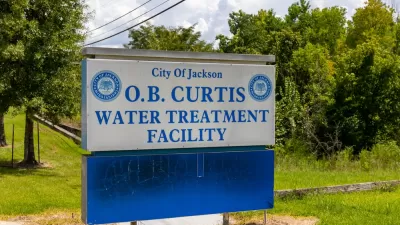Planning and funding are both in dire need in Jackson, Mississippi. The question is who should be in charge of all the planning and funding.

All eyes are still on Jackson, Mississippi, where an August emergency left an estimated 180,000 residents without drinking water.
Since then, local, state, and federal officials have been jockeying to place blame and position themselves favorably for the future. Annie Snider first reported, for example, that Rep. Bennie Thompson (D-Jackson) is seeking $200 million in funding for the city that would be allocated through the Environmental Protection Agency, thus bypassing the state of Mississippi entirely.
In the same article, Snider reports that state and local officials estimate the cost of repairing the city’s water system could be as much as $1 billion. “The city has not completed a long-term plan for addressing its problems. Thompson said $200 million is ‘what appears to be reasonable’ now, in the absence of a plan,” writes Snider.
Writing for the Mississippi Free Press in a separate article, Nick Judin details the back and forth between state and local officials as they push for funding to fix Jackson’s emergency for the long term. Jackson Mayor Chokwe A. Lumumba, for example, “has often complained of the Mississippi Legislature’s ‘paternalistic’ authority over infrastructure funds, both those derived from the federal government and from Jackson’s own citizens,” writes Judin.
Also according to Judin, Rep. Thompson is pushing for a planning process to identify the problems that caused the failure and “[extricate] itself from the depths of infrastructure collapse.”
FULL STORY: Rep. Bennie Thompson Seeks $200 Million Federal Aid For Jackson Water System

Montreal Mall to Become 6,000 Housing Units
Place Versailles will be transformed into a mixed-use complex over the next 25 years.

Planetizen Federal Action Tracker
A weekly monitor of how Trump’s orders and actions are impacting planners and planning in America.

DARTSpace Platform Streamlines Dallas TOD Application Process
The Dallas transit agency hopes a shorter permitting timeline will boost transit-oriented development around rail stations.

Without International Immigrants, the Rural US Population Would Be Falling 58%
Census data shows that population growth in rural areas is due in large part to international migrants.

Dead End: Nine Highways Ready for Retirement
The Freeways Without Futures report describes the nation’s most promising highway removal proposals.

Congressman Proposes Bill to Rename DC Metro “Trump Train”
The Make Autorail Great Again Act would withhold federal funding to the system until the Washington Metropolitan Area Transit Authority (WMATA), rebrands as the Washington Metropolitan Authority for Greater Access (WMAGA).
Urban Design for Planners 1: Software Tools
This six-course series explores essential urban design concepts using open source software and equips planners with the tools they need to participate fully in the urban design process.
Planning for Universal Design
Learn the tools for implementing Universal Design in planning regulations.
City of Mt Shasta
City of Camden Redevelopment Agency
City of Astoria
Transportation Research & Education Center (TREC) at Portland State University
City of Camden Redevelopment Agency
Municipality of Princeton (NJ)
Regional Transportation Commission of Southern Nevada





























